Summer Olympics
Welcome and thanks for visiting...

Track and Field at the Summer Olympics
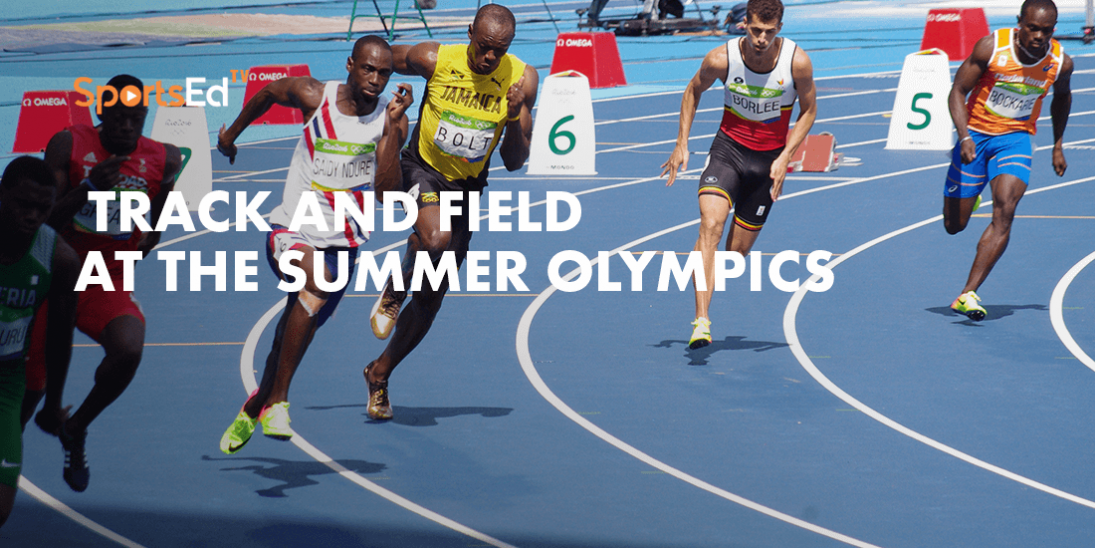
The Summer Olympics are the world's grandest stage for athletic competition, showcasing the finest athletes from across the globe.
Within this colossal event, the track and field competitions stand out as one of the most storied and electrifying segments.
Here, SportsEdTV offers the Olympic history of track and field, highlights essential rules and formats, discusses the rigorous qualification process, and introduces some of the best athletes to have graced this prestigious event and available Olympic event records
Olympic History of Track and Field
Track and field events have been an integral part of the modern Olympic Games since their inception in 1896. The inaugural Olympics in Athens featured a modest program of track and field events, including sprints, middle-distance runs, hurdles, and field events like the long jump and shot put.
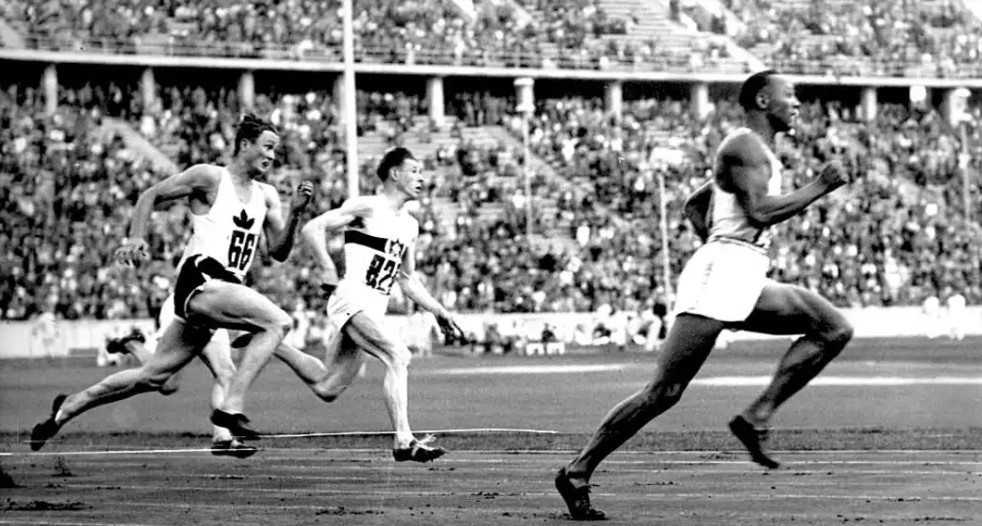
Over the years, the number of events has expanded, showcasing an array of athletic talents.
The 1900 Paris Olympics witnessed the inclusion of the women's 100 meters and the standing high jump, marking the beginnings of gender equality in track and field. The games continued to evolve, introducing various races, throwing events, and jumping competitions, each requiring unique skills and abilities.
In 1960, the Rome Olympics introduced the modern pentathlon, a combined event consisting of fencing, swimming, equestrian show jumping, pistol shooting, and cross-country running.
Track and field has produced legendary Olympians like Jesse Owens, who stunned the world by winning four gold medals at the 1936 Berlin Olympics, and Usain Bolt, whose lightning-fast sprints set the track ablaze in the 21st century. These athletes have left an indelible mark on the Olympic history of track and field.
Important Rules and Formats
Track and field comprises various events governed by specific rules and formats. Here's a glimpse into some of the key aspects:
Track Events:
Sprints
(100 meters, 200 meters, 400 meters):
Format: Athletes compete in separate lanes, and the first to cross the finish line wins.
Rules: False starts are penalized, usually with disqualification after one false start. Athletes must stay in their lanes until a designated point.
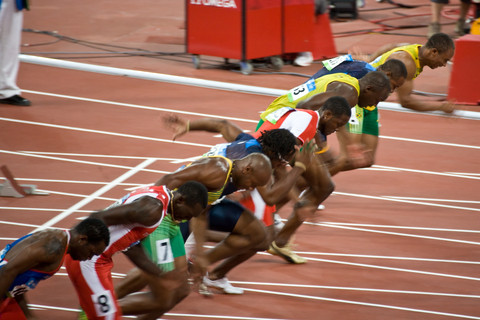
Middle-Distance
800 meters, 1,500 meters
Format: Athletes race around the track for the designated distance.
Rules: The runner who crosses the finish line first wins. Tactical positioning and timing are crucial, as these races often involve strategy and pacing.
Long-Distance
5,000 meters, 10,000 meters
Format: Athletes run multiple laps around the track or a cross-country course.
Rules: Similar to middle-distance races, the first athlete to finish wins. Stamina and endurance play a significant role in these events.

Hurdles
110 meters/100 meters, 400 meters
Format: Athletes run and jump over hurdles placed on the track.
Rules: Knocking down a hurdle incurs a time penalty. Athletes must maintain proper form over the hurdles while sprinting.
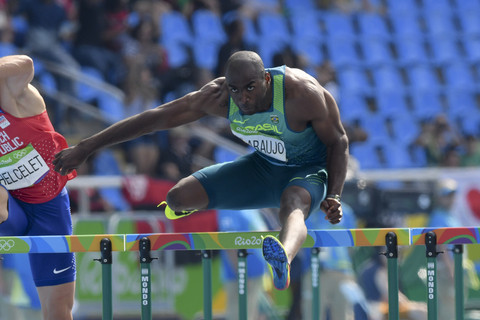
Steeplechase
3,000 meters
Format: Athletes run while clearing hurdles and a water pit.
Rules: Hurdles must be cleared, and athletes must negotiate the water pit, which is deeper than it looks, without falling.
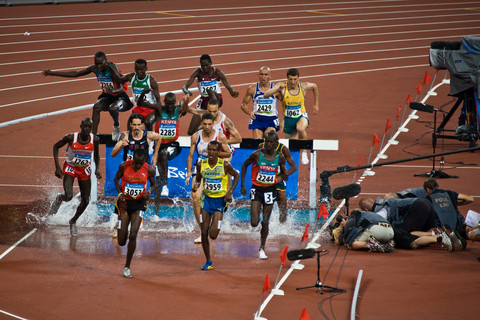
Relays
4x100 meters, 4x400 meters
Format: Teams of four athletes each run a designated distance, passing a baton to the next runner.
Rules: Proper baton exchanges are crucial. Athletes must stay in their lanes and run in their assigned order. Disqualification can occur due to improper exchanges or lane violations.
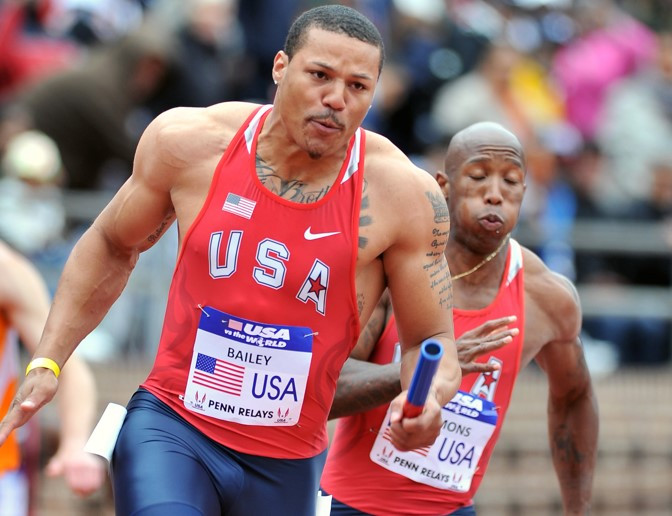
Field Events
Long Jump and Triple Jump
Format: Athletes sprint down a runway and take off from a take-off board, attempting to jump as far as possible.
Rules: The athlete's farthest jump (measured from the take-off board to the nearest mark in the sand) counts. Athletes must take off behind the designated board.
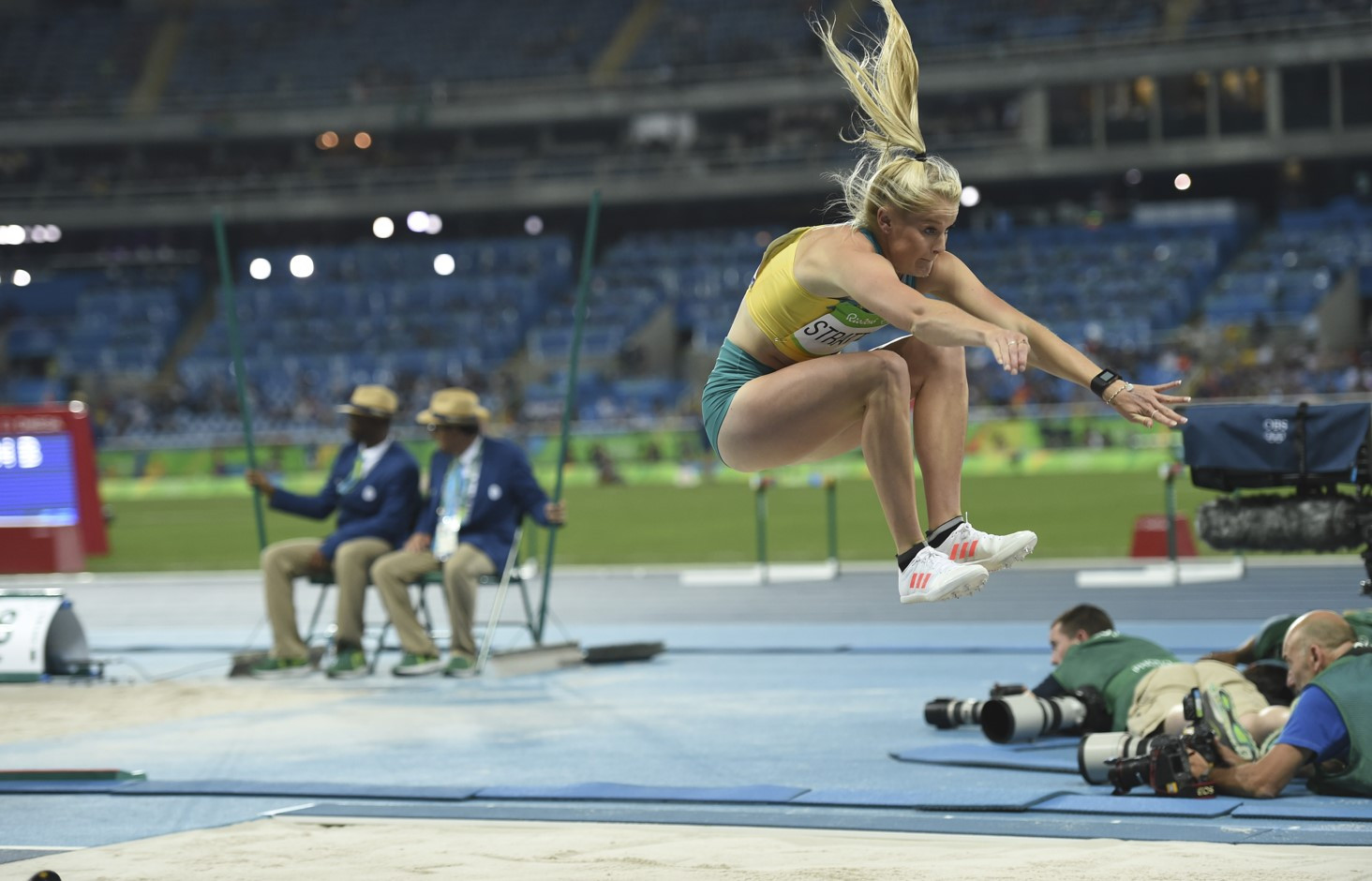
High Jump and Pole Vault
Format: Athletes attempt to clear a horizontal bar at increasingly higher heights.
Rules: Athletes have a set number of attempts to clear the bar. Knocking the bar down results in a failed attempt. In pole vault, athletes use a flexible pole to clear the bar.
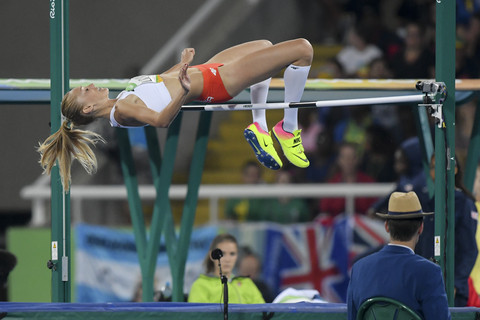
Shot Put, Discus, and Hammer Throw
Format: Athletes throw heavy objects for distance.
Rules: The farthest legal throw counts. Athletes must stay within a circle during the throw and use specific techniques for each event.
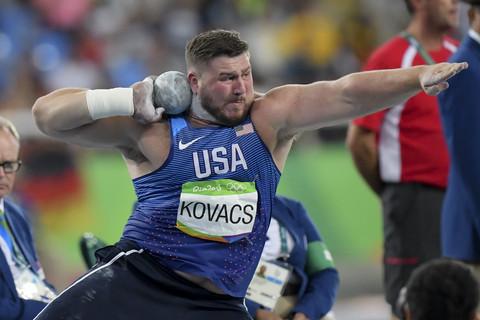
Javelin Throw
Format: Athletes throw a javelin for distance.
Rules: The javelin must be thrown with a specific grip and technique. The farthest legal throw is recorded.
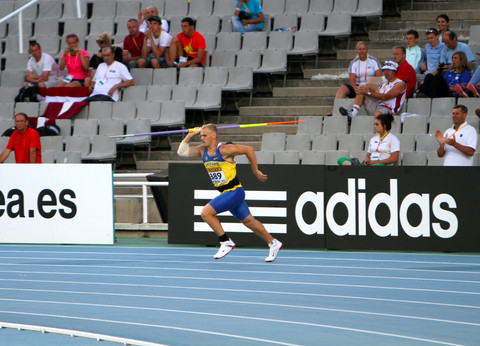
Pentathlon and Decathlon
Format: Pentathletes compete in five events, while decathletes compete in ten events over two days.
Rules: Scoring is based on performance in each event, with points awarded for time, distance, or height. The athlete with the most points wins.
Heats
To accommodate a large number of participants, events like the 100 meters and 200 meters are often divided into heats. Athletes compete in heats to qualify for the semifinals and ultimately the finals. The number of athletes advancing from each heat varies, ensuring the most competitive field in the final rounds.
Relays
Relay races, such as the 4x100 meters and 4x400 meters, involve teams of four runners passing a baton in a designated zone. Accurate baton exchanges and teamwork are vital for success, making relay events both thrilling and unpredictable.
Records
Athletes strive to break world records in track and field, pushing the limits of human performance. The International Association of Athletics Federations (IAAF), now World Athletics, oversees world records and ensures their authenticity.
Track Events
Sprints
100 meters: Olympic Record (Men) - 9.63 seconds, set by Usain Bolt (Jamaica) at the 2012 London Olympics. Olympic Record (Women) - 10.62 seconds, set by Florence Griffith-Joyner (USA) at the 1988 Seoul Olympics.
200 meters: Olympic Record (Men) - 19.30 seconds, also set by Usain Bolt (Jamaica) at the 2008 Beijing Olympics. Olympic Record (Women) - 21.34 seconds, set by Florence Griffith-Joyner (USA) at the 1988 Seoul Olympics.
400 meters: Olympic Record (Men) - 43.03 seconds, set by Wayde van Niekerk (South Africa) at the 2016 Rio Olympics. Olympic Record (Women) - 48.25 seconds, set by Marie-José Pérec (France) at the 1996 Atlanta Olympics.
Middle-Distance
800 meters: Olympic Record (Men) - 1:40.91, set by David Rudisha (Kenya) at the 2012 London Olympics. Olympic Record (Women) - 1:53.43, set by Nadezhda Olizarenko (Soviet Union) at the 1980 Moscow Olympics.
1500 meters: Olympic Record (Men) - 3:32.07, set by Noah Ngeny (Kenya) at the 2000 Sydney Olympics. Olympic Record (Women) - 3:53.96, set by Paula Ivan (Romania) at the 1988 Seoul Olympics.
Long-Distance
5000 meters: Olympic Record (Men) - 12:57.82, set by Kenenisa Bekele (Ethiopia) at the 2008 Beijing Olympics. Olympic Record (Women) - 14:40.79, set by Tirunesh Dibaba (Ethiopia) at the 2008 Beijing Olympics.
10,000 meters: Olympic Record (Men) - 27:01.17, set by Kenenisa Bekele (Ethiopia) at the 2008 Beijing Olympics. Olympic Record (Women) - 29:17.45, set by Almaz Ayana (Ethiopia) at the 2016 Rio Olympics.
Hurdles
110 meters Hurdles (Men): Olympic Record - 12.91 seconds, set by Aries Merritt (USA) at the 2012 London Olympics.
100 meters Hurdles (Women): Olympic Record - 12.35 seconds, set by Sally Pearson (Australia) at the 2012 London Olympics.
400 meters Hurdles (Men): Olympic Record - 46.78 seconds, set by Karsten Warholm (Norway) at the 2020 Tokyo Olympics.
400 meters Hurdles (Women): Olympic Record - 52.70 seconds, set by Sydney McLaughlin (USA) at the 2020 Tokyo Olympics.
Field Events
Long Jump
Men's Olympic Record: 8.90 meters, set by Bob Beamon (USA) at the 1968 Mexico City Olympics.
Women's Olympic Record: 7.40 meters, set by Jackie Joyner-Kersee (USA) at the 1988 Seoul Olympics.
High Jump
Men's Olympic Record: 2.39 meters, set by Charles Austin (USA) at the 1996 Atlanta Olympics.
Women's Olympic Record: 2.06 meters, set by Yelena Slesarenko (Russia) at the 2004 Athens Olympics.
Pole Vault
Men's Olympic Record: 6.03 meters, set by Thiago Braz da Silva (Brazil) at the 2016 Rio Olympics.
Women's Olympic Record: 5.05 meters, set by Yelena Isinbaeva (Russia) at the 2008 Beijing Olympics.
Shot Put
Men's Olympic Record: 23.12 meters, set by Ryan Crouser (USA) at the 2020 Tokyo Olympics.
Women's Olympic Record: 22.41 meters, set by Natalya Lisovskaya (Soviet Union) at the 1988 Seoul Olympics.
Discus Throw
Men's Olympic Record: 69.89 meters, set by Virgilijus Alekna (Lithuania) at the 2004 Athens Olympics.
Women's Olympic Record: 72.30 meters, set by Gabriele Reinsch (East Germany) at the 1988 Seoul Olympics.
Hammer Throw
Men's Olympic Record: 84.80 meters, set by Sergey Litvinov (Soviet Union) at the 1988 Seoul Olympics.
Women's Olympic Record: 82.29 meters, set by Anita WÅodarczyk (Poland) at the 2016 Rio Olympics.
Javelin Throw
Men's Olympic Record: 90.57 meters, set by Andreas Thorkildsen (Norway) at the 2008 Beijing Olympics.
Women's Olympic Record: 72.28 meters, Barbora Špotáková (Czech Republic) set at the 2008 Beijing Olympics.
Qualification for Track and Field
Earning a spot in the Olympic track and field competitions is a daunting challenge. Qualification typically involves achieving specific performance standards or winning national trials. National Olympic committees also play a role in selecting athletes representing their respective countries.
International Olympic Committee (IOC) Directory: The IOC maintains a directory of National Olympic Committees (NOCs) worldwide on its official website.
Here is the link to National Olympic Committees
Additionally, countries may earn quota places for specific events based on their performance at international competitions or the World Athletics rankings. This system ensures that the most talented and deserving athletes make it to the Olympic stage.
Legendary and Future Stars
Track and field has seen many legendary athletes and future stars continue to emerge. Some of the standout athletes include:
Usain Bolt (Jamaica): The fastest man in history, Bolt's charisma and dominance in the 100 meters and 200 meters made him a global icon.
Carl Lewis (USA): Lewis won multiple gold medals in sprints and long jump and symbolized American track and field excellence.
Florence Griffith-Joyner (USA): Known for her striking fashion and blistering speed, Griffith-Joyner set world records in the women's 100 meters and 200 meters.
Elaine Thompson-Herah (Jamaica): Continuing Jamaica's sprinting tradition, Thompson-Herah has recently dominated the women's 100 meters and 200 meters.
Karsten Warholm (Norway): The world record holder in the men's 400-meter hurdles, Warholm's technical prowess and raw speed have redefined his event.
In each Olympic cycle, new talents emerge, ready to etch their names in track and field history annals.
Track and field at the Summer Olympics encapsulates the essence of sport – raw athleticism, precision, and determination. From its humble beginnings in Athens to the world-renowned spectacle it is today, it continues to inspire generations of athletes and fans. As the Olympic Games continue to evolve, track and field will undoubtedly remain a focal point, celebrating the extraordinary capabilities of the world's finest athletes.








